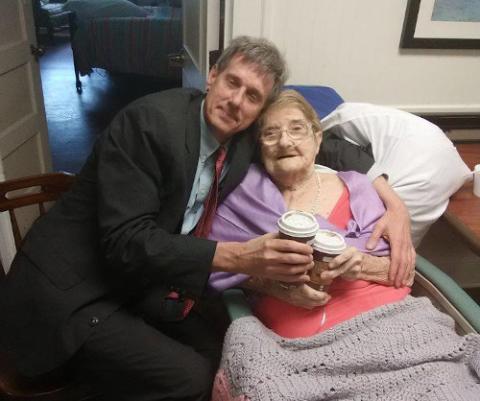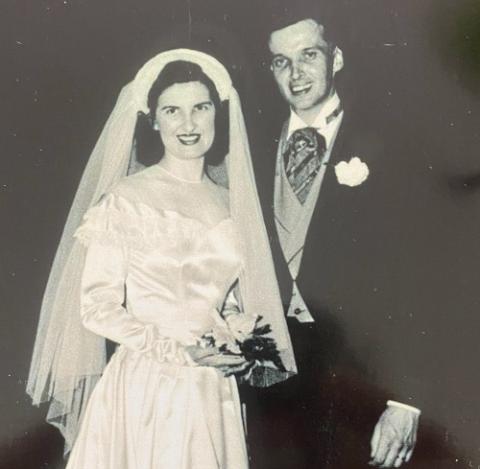
Most Holy Redeemer Cemetery in Baltimore, Maryland. (Wikimedia Commons/Bohemian Baltimore)
Under the brilliant sunshine on June 1 at Most Holy Redeemer Cemetery in Northeast Baltimore, Mom's five children, a handful of other loved ones and close family friends stand before her casket. We're all masked. We practice social distancing.
A priest from St. Anthony of Padua, the childhood church my mother, Margaret Donohue Gately, returned to later in life, plays Amy Grant's version of "How Great Thou Art" on his cellphone. Nobody sings along, for we can hardly hear the tinny music. The priest reads from Isaiah and the Gospel of John and speaks a few words about the 97-year-old family matriarch whom he had never met. Then we part, 20 minutes after we arrived.
It was never supposed to be this way, of course. It would have been unthinkable little more than three months earlier, when to most of us corona still meant a beer you drank at the beach.

The author, Gary Gately, is pictured with his mother, Margaret Donohue Gately (Provided photo)
In Mom's final months, we would have visited her at her assisted living home, but could not because of COVID-19 restrictions depriving her — and us — of being at her bedside in her final days. None of her five children or 11 grandchildren is into Zoom. I did one session with Mom in early April. Suffering dementia, she did not recognize me. I never saw her alive again.
But for the coronavirus restrictions, hundreds of people would have visited the funeral home for the viewing over several days, mourning her loss and celebrating her life with stories, prayer and eulogies.
Jesuit Fr. William Watters, a longtime family friend, would have celebrated the Mass of Christian Burial and delivered one of his exquisitely eloquent homilies. But at age 86, he's on lockdown at a retirement community in Baltimore.
As we sang Mom's favorite song, "Ave Maria," we would have pictured her crooning it in her Marlboro 100-worn voice in the kitchen as she performed her own little miracle of the loaves and fishes, somehow stretching a pound of jumbo lump crab meat to feed a dozen people thin crab cakes fried in oil.
Then, in the Irish tradition, we would have gathered at a reception with plenty of homemade dishes, drink flowing freely and sobs and embraces giving way to stories and, yes, laughter.
Instead, just a handful of us at a time could pray before her coffin at the funeral home in suburban Baltimore. I knelt before her coffin, my teenage sons, Joseph and Paul, a few feet behind me, and held Mom's right hand and the rosary in it.
I prayed aloud as we had so often prayed outside College Manor Assisted Living, in the Baltimore suburb of Lutherville-Timonium: one Our Father, one Hail Mary, one Glory Be to the Father. (Mom prayed them rapid-fire, perhaps a result of nine decades of saying rosaries and penance.)
Then, I prayed the words she had always added: "St. Anthony, pray we find our way." I close my eyes, and can still hear her: "Almighty Father, we ask you in the name of your Divine Son, Jesus Christ, help us to do your holy will, and if we can't do it, do it for us and let us know you did."
I always loved the humility in that last part, acknowledging the paradox of powerlessness, of surrender, and inevitably leading to Mom's favorite expression: "Trust in God."
I did not weep in the few minutes I had inside the funeral home or at the abbreviated graveside service. Nor did anyone else, though we all have shed torrents of tears privately since.
It all happened so fast: COVID-19 robbed us — and more importantly, Mom — of a proper goodbye, leaving me feeling hollow, hurt, angry and guilty.
Such emotions have played out across the world as pandemic-driven restrictions shatter our expectations of how we grieve and bury our dead, grief counselors and clergy say.
Advertisement
"It's just heartbreaking when we can't mourn the loss of a loved one as we should, or someone's dying alone in a nursing home, and we can't be there," said Franciscan Fr. Timothy Dore, who serves as pastor of St. Michael the Archangel Church and two sister parishes in the Baltimore area.
"At some of the funeral services I've done recently, I've found myself preaching on the minds of the disciples who stood at the cross of Jesus while he was dying," he said. "And they probably felt confused, maybe angry, maybe like God had let them down and thought, 'What the hell is going on here? This wasn't supposed to happen this way.' "
Shannon O'Neill, a psychologist and assistant professor of psychiatry at Mount Sinai Hospital in New York City, said it's important to seek support from others, be gentle and patient with yourself, and acknowledge your grief and even anger that you couldn't provide a loved one a fitting farewell.
"I come from a large Irish-Catholic family, and our mourning and burial practices are steeped in traditions that go well beyond spiritual and symbolic reasoning," O'Neill said. "They provide predictability and comfort and security, and these things are so important. We embrace one another when we sob, but then the tears always turn to laughter, and that's a beautiful thing. The pandemic has deprived us so much of that though."
O'Neill suggests sharing oral and written stories about our loved ones, perhaps in the form of letters to them, and even setting up an empty chair and reading the letters aloud to them — and planning a full celebration of life after the pandemic passes.
On that blessed day, we'll no doubt feel Mom's presence and see her and hear her, holding court, telling stories, laughing that gravelly Lucille Ball laugh.

Margaret Donohue Gately on the day of her marriage to Bernard Patrick Gately, Jr. (Provided photo)
"I'm tough and hearty; hearty like a moose," she'd say. The nickname stuck, and I don't know if I ever recall her happier than when she wore a "Merry ChristMoose!" sweatshirt on Christmas morning when all the kids, grandchildren and in-laws came over.
I smile when I hear Moose chiding me yet again, "You could drive Christ crazy!"
Or sharing the "lard bread" story, dating to her early childhood in the Great Depression in East Baltimore: "You kids think you got it tough? Some days, we ate that damn lard bread — bread covered by lard that the baker gave out — and, if we were lucky, stale donuts!"
We'll marvel anew at how Mom returned to work after two decades of raising kids because she had no choice after emphysema left my father disabled, and Mom briefly relied on food stamps to support us. She started in the typing pool at the Social Security Administration, went to college on Uncle Sam's dime, prevailed in an age discrimination claim, got all her children through college and retired a top executive.
"Margaret Donohue Gately was a woman of steel and of fire," her first granddaughter, Maeve Donohue Gately, wrote in a tribute she shared with us. "Margaret did not fit into any of the boxes that society reserved for women. … When I really think about what made me a strong woman, a woman who expects, who demands fair treatment and her place in the world, a big part of that identity must come from my grandmother."
Maeve recalled the words of her father, Mom's first son, Mark Donohue Gately: "If she had been born a generation later, she would have been a CEO."
Mark remembered how much Mom loved reading and revered libraries — and how incensed she became in 2001 when former Baltimore Mayor Martin O'Malley closed the Gardenville Library branch a half-block from the home she lived in during her teenage years and returned to in the early 1980s after the death of her step-brother who had lived there.
"What kind of hoodle would close a library?" she snapped, employing a Baltimore term for someone who's not all there. "He acts like he doesn't have all God gave him."
I picture her now, sipping a coffee, letting out a long "ahhhh," dragging on a Marlboro 100 and regaling Jesus and the angels and saints with her stories. She is laughing until her belly shakes. They laugh with her.
And before long, we will give Mom the proper send-off coronavirus cheated us and her out of, raise a Guinness to her and laugh with her again.
[Gary Gately is a Baltimore-based journalist who has written for publications including The New York Times, The Washington Post, The Guardian, The Boston Globe, The Baltimore Sun, CBSNews.com and CNBC.com.]




